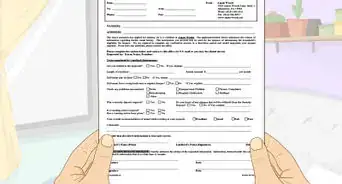This article was co-authored by Susan Pazak, PhD. Dr. Susan Pazak is a Licensed Clinical Psychologist & Professional Life Coach. With more than 21 years of experience, she specializes in treating adolescents and adults with psychological issues using cognitive behavioral therapy, symptom reduction skills, and behavior modification techniques. She has been featured in numerous media outlets and shows, including “My Strange Addiction". Dr. Pazak holds a BA in Psychology with a minor in Communications from The University of Pittsburgh, an MA in Clinical Psychology from Pepperdine University, and a PhD in Clinical Psychology from Alliant International University.
wikiHow marks an article as reader-approved once it receives enough positive feedback. In this case, 100% of readers who voted found the article helpful, earning it our reader-approved status.
This article has been viewed 126,799 times.
Walking on eggshells is very tiring. You may find yourself doing just that if you live with someone who is controlling. Whether this is a significant other, family member, or friend, controlling people are draining. Navigate the day-to-day by staying calm and not taking things personally. Set firm boundaries with the controlling person and assert yourself when necessary. Find freedom outside your home by spending time with friends.
Steps
-
1Remain calm during frustrating situations. If you meet a controlling person with hostility, you are only fanning the flames. When someone is attempting to control you, remain calm. Being controlled is understandably frustrating, but a calm response is more productive than an angry one.
- People who strive to control are often deliberately aggressive. They use this tactic to intimidate you into bowing to their will. If you show you will not be intimidated, they're less likely to target you.
- Stay calm when being confronted or criticized. Before reacting, take a very deep breath and wait a few seconds. Do not respond to a command immediately, as you may end up saying something you regret.
- Instead of firing back with angry criticism, say something like, "I'll think about it" or "Let's talk this over later." This buys you some time to think about healthy ways to set boundaries.
-
2Do not take it personally. If a person is controlling, it isn't about you. Even if a control person blames you for their behavior, this is not the case. A controlling person has their own reasons and issues that have nothing to do with you. In frustrating moments, try to empathize with the controller.
- For example, you live with your boyfriend who tends to be very controlling. One night, you say you're going out with a friend and will be back late. He tells you he wants you back by a certain time that you find unreasonably early.
- In response, do not feel bad. You haven't done anything wrong. Instead, consider why your boyfriend behaves this way. For example, "My boyfriend is so controlling, but his dad put a lot of pressure on him growing up. I understand he feels uncomfortable if he’s not in control, but I can’t give up my life for his temporary comfort.”
- Keep in mind, controlling another person is never okay. Acknowledging how and why the behavior occurs does not excuse it. Having perspective is a means to keep your self-esteem intact in the moment. It is not a permanent solution. In the future, you will need to work towards establishing healthy boundaries.
Advertisement -
3Incorporate humor. A good sense of humor can help alleviate the tension of hostility. If you're able to, try to use appropriate humor to defuse the situation. Keep in mind, however, this works best in more mild situations. If someone is getting very hostile, they may not take well to humor.
- For example, you live with your mother, who tends to be very controlling. On occasion, she acts out by ignoring you when you defied her orders. You come home one day and say something like, "How was your day?" Your mother does not respond.
- Give a lighthearted, humorous response. For example, "Cat got your tongue?” Or, “Earth to mom!" This may help defuse the situation.
-
4Learn to pick your battles. You do not want to get into a power struggle with a controlling person. Controlling people, by nature, thrive on these kinds of confrontations. Let go of unimportant matters.[1]
- For example, you live with your father, who dislikes it when you leave half-full glasses in the fridge. He tends to get on your case about it, which you find frustrating.
- While this is certainly annoying, you can probably tune out this criticism. It's a minor issue and not worth engaging in a power struggle. Try to leave glasses in the fridge less often. Save your energy for more important matters.
-
5Do not indulge in unhealthy behaviors. A controlling person may not just seek to control you. They may also try to control their surroundings, friends, family members, and other people. A controlling person will often enlist your help to indulge unhealthy behaviors. Doing so will not help either one of you.[2]
- For example, your girlfriend gets very controlling in regards to social plans. When you make plans with mutual friends, she always has a reason to change them, often last minute. She may, say, expect you to be on her side when she demands to change a meeting place for a social gathering last minute.
- Do not agree to do this if you don’t want to. Be firm and say something like, "I think Theo really likes this bar. We've had these plans for a while, so let's just meet there. The place you want to go to is a little out of the way for everyone."
Setting Firm Boundaries
-
1Try to understand the person's need to control others. This can help you figure out how to best address the issue. Remember, a person's reasons never excuse the behavior. Knowing these reasons, however, can make establishing boundaries go more smoothly.[3]
- Usually, controlling behavior is some kind of defense mechanism. People use it as a way to bury emotions that trouble them. Consider the person who controls you. What issues do they have that may manifest in a need for control?
- Most controlling people have issues with anxiety. They feel uncomfortable in the world and try to assuage their nerves via control. Try to understand how the controlling person may feel on the inside. Maybe they lacked stability in childhood. Maybe they've had bad relationships in the past. All this can manifest itself in a need for control.
-
2Embrace your fundamental rights. If you're living with someone who's chronically controlling, it can be easy to forget your own rights. Controlling people often blame others for their behavior, and make those around them feel their demands are reasonable. This is not the case. You have fundamental rights as a person and controlling people tend to violate them.
- Everyone has the right to be treated with respect. If you feel disrespected by someone, even if that person did not intend to disrespect you, that's not acceptable.
- You are allowed basic independence. You should be able to express your own feelings and wants. You are allowed to have different opinions than others.
- You should be allowed to have your own priorities. You should be able to say "No" to someone without feeling guilty.
-
3Be clear about what behavior is and is not acceptable. You need to make this clear to the controlling person. Part of setting boundaries is establishing where the line is. When talking to the person, make it clear what you will not tolerate. Convey which behaviors you find disrespectful and damaging to your relationship.[4]
- Controlling people have a tendency to push back your boundaries, so be firm. A controlling person may debate with you, or allow boundaries to slip over time. When asserting yourself, be very clear and keep boundaries in place. For example, you might set a boundary by telling your boyfriend, "I feel uncomfortable and hurt when you curse at me during arguments. I do not want you cursing at me anymore." And then set a limit such as, "If you start cursing at me, I will end the conversation or leave the house until you calm down."
- If your boyfriend responds with something like, "I would argue people just curse when they talk and it's an accepted part of speech now. It's how I express myself." Restate your boundaries. Say something like, "I understand you feel that way, but I find it disrespectful and I'm not going to tolerate it anymore."
- In the future, your boyfriend may push the boundaries. He may not curse directly at you, but drop foul language when attempting to assert control. When this occurs, remind him of the boundary you set. For example, "You're cursing at me, and I told you that's not acceptable."
-
4Accept some people will not change. You cannot make a person change. Even when you state your boundaries, many controlling people lack the mental strength to change. If someone does not relinquish control, you need to consider ending the relationship and moving out.[5]
- Remember, it is not about you. Controlling people have issues they're failing to deal with, that often manifest in a need for control.
- You have a choice in the situation. You can accept their rules, or you can disengage. Disengaging often means terminating the relationship, or lessening contact as much as possible.
-
5Recognize when control is abuse. Control can cross the line into abuse, especially in romantic relationships. If you feel controlled and isolated in your home, reflect on whether or not this behavior is actually abusive.[6]
- Financial control can be a major red flag. Does this person control how you spend money? Do they give you a hard time over your expenses or withhold your credit card at times? They may also do things like read credit card bills or bank statements and force you to explain all your spending.
- Does this person isolate you? Many abusers will try to cut you off from forms of support. They may make you feel guilty for spending time with family and friends or doing anything not directly related to them.
- Abusers are good at denying their bad behavior. They may blame circumstances (i.e., "I was panicking when I cursed at you! You can't hold me accountable!"). They may also blame past experiences (i.e., "I've been cheated on in the past, which is why it's hard for me when you go out without me."). They may also shift blame to you (i.e, "If you gave me more reasons to trust you, I wouldn't be so controlling.").
-
6Assert yourself when necessary. You cannot allow yourself to be controlled in all situations. If you feel like your boundaries are really being violated, assert yourself in the moment. Be firm, but not aggressive, as you calmly state your case.
- When you feel like a boundary is crossed, say so in no uncertain terms. Let the person know what they did wrong, and explain the consequences for this behavior.
- Remember to stay calm. Becoming hostile yourself will only show the aggressor they're getting a reaction. For example, your boyfriend berates you for having come home too late. He says something like, "I don't like you running around with your friend Lucy. I don't think she's a suitable friend for you." Do not respond by saying something angry, like, "You are being a jerk for telling me who I should and shouldn't be friends with. This is ridiculous."
- Instead, say something like, "I have a right to choose my friends. You don’t have to like my friends, but you can’t force me to stop spending time with them."
Escaping the Situation
-
1Stay out of your home as much as possible. If you're unable to get out of your living situation, seek space whenever possible. Try to spend as much time away from home as possible for your own mental health.[7]
- You can spend time at public places. You can, for example, bring your laptop to a coffee shop and browse the internet for an afternoon.
- Spend time with friends. If you're unhappy being at home, go to a friend's house for a night or invite people to go out on the town with you.
-
2Avoid dependence on a controlling person. This is sometimes not easy to do, especially if the controlling person is a parent or a spouse. However, work on getting your own money and finances together. You do not want to be dependent on a controlling person financially, as this will rob you of a lot of independence.[8]
- You should also protect yourself emotionally. Do not reveal your deepest feelings and secrets to a controlling person. They may use these things to control you later on. Keep your own friends group and support system in tact.
-
3End the relationship, if necessary. You may need to move out if the situation has gotten out of control. You can try staying with a family member or friend. Let the controller know you're not interested in having a relationship with them any longer.[9]
- It can help to think about what you would advise someone else in your situation to do. Imagine someone else coming to you and outlining these problems. Would you tell them to leave?
- Think about what you would gain by ending the relationship. Would you have significantly less stress in your life? Would you be able to better focus on your own goals?
- Think about why you're staying. Do you feel sorry for the person? Often, a sense of guilt keeps people in negative relationships.
-
4Consider cutting off contact. After moving out, this may be a good option. Controlling people are very good at manipulation. A controlling person may continue to cause you stress even after you're no longer sharing a home with them. Consider avoiding events they will be attending, blocking their phone number, and not seeing them again in the future.[10]
-
5Contact the authorities, if necessary. Controlling people can sometimes get dangerous. If someone is preventing you from leaving physically, or if someone is harassing after you've moved out, report the behavior to the police.
- If you are a minor in a controlling situation, contact a family law attorney. Many family law attorneys will offer consultation for free if you're being abused. You can look into legal emancipation if you need to escape an abusive situation.[11]
Expert Q&A
-
QuestionHow do you outsmart a control freak?
 Susan Pazak, PhDDr. Susan Pazak is a Licensed Clinical Psychologist & Professional Life Coach. With more than 21 years of experience, she specializes in treating adolescents and adults with psychological issues using cognitive behavioral therapy, symptom reduction skills, and behavior modification techniques. She has been featured in numerous media outlets and shows, including “My Strange Addiction". Dr. Pazak holds a BA in Psychology with a minor in Communications from The University of Pittsburgh, an MA in Clinical Psychology from Pepperdine University, and a PhD in Clinical Psychology from Alliant International University.
Susan Pazak, PhDDr. Susan Pazak is a Licensed Clinical Psychologist & Professional Life Coach. With more than 21 years of experience, she specializes in treating adolescents and adults with psychological issues using cognitive behavioral therapy, symptom reduction skills, and behavior modification techniques. She has been featured in numerous media outlets and shows, including “My Strange Addiction". Dr. Pazak holds a BA in Psychology with a minor in Communications from The University of Pittsburgh, an MA in Clinical Psychology from Pepperdine University, and a PhD in Clinical Psychology from Alliant International University.
Licensed Clinical Psychologist & Professional Life Coach Instead of trying to outsmart the controlling individual, speak with them directly to address the specific controlling behaviors that you'd like to change. Then, address the controlling behaviors every time you observe them.
Instead of trying to outsmart the controlling individual, speak with them directly to address the specific controlling behaviors that you'd like to change. Then, address the controlling behaviors every time you observe them.
Warnings
- If your outside life has deteriorated because of this person, they're not worth it.⧼thumbs_response⧽
- Controlling relationships can quickly become abusive. Seek therapy immediately if you feel that you cannot escape.⧼thumbs_response⧽
References
- ↑ http://www.drjudithorloff.com/Free-Articles/How-To-Deal-With-A-Control-Freak.htm
- ↑ http://www.dailymail.co.uk/home/you/article-1302219/How-control-control-freak-Our-troubleshooting-guide-main-types.html
- ↑ http://www.guystuffcounseling.com/counseling-men-blog/bid/21219/Marriage-Help-How-to-Deal-with-a-Controlling-Wife-Like-Kate-Gosselin
- ↑ http://blogs.psychcentral.com/imperfect/2016/07/how-to-deal-with-people-who-repeatedly-violate-your-boundaries/
- ↑ http://blogs.psychcentral.com/imperfect/2016/07/how-to-deal-with-people-who-repeatedly-violate-your-boundaries/
- ↑ http://www.helpguide.org/articles/abuse/domestic-violence-and-abuse.htm
- ↑ http://blogs.psychcentral.com/imperfect/2016/07/how-to-deal-with-people-who-repeatedly-violate-your-boundaries/
- ↑ http://www.drjudithorloff.com/Free-Articles/How-To-Deal-With-A-Control-Freak.htm
- ↑ http://www.dailymail.co.uk/home/you/article-1302219/How-control-control-freak-Our-troubleshooting-guide-main-types.html
About This Article
To live with a controlling person, try to remain calm during frustrating situations to prevent things from escalating. Controlling people thrive on confrontations, so learn to pick your battles. It's also important to make it clear what behavior is and is not acceptable. If you feel like your boundaries are being violated, it's okay to assert yourself and express your opinion about that. Even when you state your boundaries, some controlling people won't be able to change. If you feel controlled and isolated in your home, talk to a friend or family member about how you can get out of the situation. For more tips on escaping a bad situation at home, read on!













































































